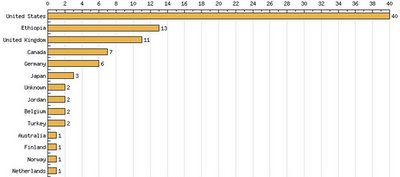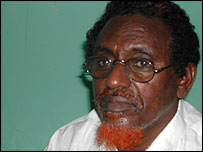Thursday, August 24, 2006
Statement II of the Renewal Committee
Please click here to read a statement by the North America SEPDC Renewal Committee on Prof. Beyene Petros' frivolous attempt to explain away his betrayal of the people's trust.
Friday, August 18, 2006
End of Blockade?
Since earlier this summer the Ethiopian government has been blocking most web sites and blogs (this one included) that are critical of it. Apparently that blockade is over, at least for now, as you can see from the graph below for the countries of the last 100 visitors to Enset blog from today and as confirmed by a recent posting on Seminaworq, a blog run from within Ethiopia.

The response from the Ethiopian blogosphere to the blockade was to educate Ethiopians at home on ways to bypass the blockade and to put a "Do Not Enter" sign in a prominent place on the blocked web sites and blogs to publicize the government's futile attemt to suppress the free exchange of information and ideas. The blockade lasted for about three months, and in the end the government blinked. To my knowledge, no blogger or webmaster has bothered to change the internet domain they are running on. Anyhow, the government could have easily added the newer domain names to its list of blocked URLs just as it did with the current ones, and it would have been a waste of time to change a domain name because of the blockade.
Why the Addis Ababa regime decided to unblock the web sites is anyone's guess. But it seems to me that the government probably decided that the criticism it has been getting from the donor community for its continued blocking of these web sites got to a point beyond which it could not defend its actions. I have a feeling that a lot of folks from the donor community in Addis peruse these blocked web sites and blogs to gauge the temperature of the Ethiopian political scene and they probably did not like being inconvenienced in accessing these web sites and blogs.
As important as these web sites and blogs may be in the evolution of freedom of expression in the Ethiopian political culture, their importance pales in comparison with the role that was played by the independent newspapers and magazines that are now silenced by the regime in power. The Addis Ababa regime must realize that the road it has chosen in the aftermath of the May 2005 elections is a dead end one and it will never be able to silence the Ethiopian people by continuing to jail journalists who criticize it. Therefore, it should release all journalists and the thousands of political prisoners it currently holds in its rotten jails immediately and without any preconditions.
In any case, I welcome the government's action to unblock these web sites and blogs. However, the "Do Not Enter" sign on this blog will remain until such a time that the lifting of the blockade is widely acknowledged as not being a temporary measure on the part of the regime.
Saturday, August 12, 2006
An Open Letter to Sheikh Hassan Dahir Aweis
By Liban Ahmad
I am writing this open letter to you in the hope of adding my voice the many Somalis who shared ideas with you so as not to see the efforts of the United Islamic Courts of Somalia become an exercise in futility, and your personality a byword for demagoguery.
I believe that successive Somali governments (former Transitional Somali Government and current the Transitional Federal Government) failed to address the question about Somalis whose names are included in the suspected terrorist list of several countries. My unease over our selected leaders' approach to the question stemmed from the fact that failed states like Somalia has no time to harbour terrorists. Foreign countries want reassurance that Somali citizens are not involved in terrorism. That is partly the job of any Somali government.
You are a Somali citizen and a political and religious leader as well. Like it or loathe it, your actions and judgement will have ramifications for national reconciliation.
You were quoted as saying that the Islamic courts will go the southern parts of Galkacyo "because people from that town want the courts there." If the quoted words are yours, I doubt you are acting out of your Muslim heart; you may be acting out of your tribal heart. Reason: your actions may destroy the 13 year old agreement that led to peaceful coexistence in Galkacyo. Damages may outweigh benefits. You will be remembered for failing to understand what the late General Mohamed Farah Aideed and President Abdullahi Yusuf had understood: that they have obligation to work towards peace in Galkacyo.
You have an obligation to rein in any members from Southern Galkacyo who might be carried away by the UIC's swift victory over warlords. Failure to do that will mean you are sanctioning clan warfare. A sense of history can be of help to you. And remember that "the study of history is a powerful antidote to contemporary arrogance."
Remember that the name you use -Islamic Courts- always gives wrong impression: Somalia has never lived under an Islamic state nor did it have an effective central government for the past fifteen years. How can a religion and clan based group administer justice when courts are known by clan names? The court of Sacad, The court of Abgaal, The court of Sheekhaal, the Court of Raxanweyn, the Court of Marehan etc, etc? Do you think that Islamic state will thrive if one adopts grassroots approach that empowers every clan to become a state within a state? Have you forgotten the countless Somalis who were killed or maimed on the basis of the clan they belonged to? How can justice be done under an unjust designation?
The United Islamic Courts of Somalia are a new force that still has the potential to contribute to Somalia's future positively. The UIC's foreign policy is quite discouraging. What benefit will Somalis gain if our energy that can be channelled to nation building and national recovery is directed towards antagonising neighbouring countries to achieve personal aspirations?
Whose task is it to formulate foreign policy? The Transitional Federal Government of Somalia (TFG) or the United Islamic Courts of Somalia? Already the presence of United Islamic Courts have affected the relation within The TFG troika-Parliamentary Speaker Shariif, President Yusuf and Prime Minister Geeddi. This is not a small feat. It shows that the TFG is ready for power-sharing. The Transitional Parliament has one virtue: it is pyre of personal ambition aimed at serving clan interests. Every top politician can be challenged. MPs may be fractious but they debate issues candidly.

Sheikh Hassan Dahir Aweis: Misguided or Pious?
As a Sheikh you have obligation towards Allah and towards people who regard you as an example to follow. Avoiding any unprovoked action or any move that may have adverse consequences for Somali clan relations ought to be uppermost in your mind. Why so keen on opening a questionable court in a part of Somalia that has benefited from self-rule, that has not been blighted by warlords? Don't you think that such actions can create major disagreement on governance for Somalis in the future? Do you want Somalia to become like countries that instituted Sharia law in some parts while other parts use secular laws? Why so keen on being regarded as Amiir Muminiin in Somalia when your words and actions polarise people who have coexisted peacefully? Remember that religious innovation is a sin in Islam. Why do you combine elements of Jahiliya with basic Islamic precepts?
Many people have raised questions about Hargeisa based Court's desire to see you in court so you can answer questions about your alleged role in the murder of expatriates in 'Somaliland'. Do you think those people will be on your side if you choose to become a DEMAGOUGE?
You blame members of the TFG for being pro-Ethiopia whereas your actions seem to be endangering peaceful coexistence on which Somalis agreed without the help of any foreign country! Can't you see the contradiction in your words and actions?
May I anticipate that wisdom and foresight prevails in Somalia.
Monday, August 07, 2006
The Dilemma Facing Somalis
Imagine that you are a Somali expatriate living in North America or Europe and that you are hearing the good news that has been coming out of Somalia in the last couple of months, the good news that for the first time since 1991, when rival warlords who overthrew the Barre regime made most of southern Somalia ungovernable, life in the capital city of Mogadishu is getting better under the rule of the Islamic Courts Union, now renamed the Supreme Islamic Courts Council (SICC). And then imagine hearing that this group that has brought much needed stability to a significant portion of southern Somalia is beginning to impose a strict form of Sharia law that is reminiscent of Afghanistan under Taliban rule.
If you are a Somali watching events unfold from afar, what would you do? Should you give the benefit of the doubt to SICC in the hope that it will institute a benign form of Islamic government in the areas it controls, or support the Transitional Federal Government (TFG) of Somalia that is recognized by the international community but has very little authority in Somalia itself? This is the dilemma that a lot of Somalis are wrestling with these days, as it is evident from the plethora of articles that Somali expatriates are writing about current events in their homeland. Here below are some samples:
"Another Afghanistan Could Be Averted"
By Abdifatah Ismail (South Africa)
"Actions and inactions by Western governments contribute to the current events in Somalia"
By Mohamed Mukhtar Ibrahim (United Kingdom)
"The Struggle for Somalia: Warlords, Islamists, US Global Militarism and Women"
A Somali Woman Discusses the Sharia Court and Her Cousin Who Leads It
By Amina Mire (Canada)
"Why Ethiopia-bashing Is Not The Right Option For The United Islamic Courts Of Somalia"
By Liban Ahmad (United Kingdom)
It is sad to see the circumstances that the Somali people had to endure in the last 15 years, and there is no question that interference by foreigners, including Ethiopians, in Somali internal affairs has contributed significantly to the failure of the Somali state and the many attempts to reconstitute it. However, the main obstacle to reconstituting a central government in Somalia remains the unhealthy premium that the Somali society places on its clans, which only the Somalis themselves can remove.
Comparing Mogadishu's current Islamist rulers to the Taliban may be a bit of a stretch at this point. However, there is an eerie similarity between the route the two groups took in their rise to power -- both of them offered an Islamic fundamentalist ideology, radical political Islam, as an antidote to the lawlessness and chaos that ravaged their respective countries. This similarity coupled with the recent history of radical political Islam in inspiring terrorism and suppressing basic human rights is a very good reason to be alarmed about the rise of the Islamists in Somalia. Ethiopia, Somalia's neighbor and rival, with an estimated Muslim population of at least 30 million of which 4 million are ethnic Somalis, can not afford to have a radical political Islam take root in its backyard. Neither does Somalia!
